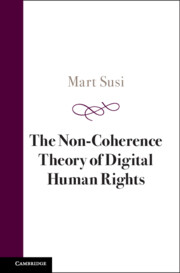Book contents
- The Non-coherence Theory of Digital Human Rights
- The Non-coherence Theory of Digital Human Rights
- Copyright page
- Contents
- Acknowledgements
- Introduction
- Part I The Contextual Challenges and Purpose of the Non-coherence Theory of Digital Human Rights
- Part II Reflections on Some Theories and Doctrines
- 6 The Doctrine of the Sameness of Rights Online and Offline
- 7 Claims of New Internet-Specific Human Rights
- 8 The Capabilities Approach
- 9 The Frankfurt School and the Normative Order of the Internet
- 10 The Articulation and Critical Review of Self-Normativity
- 11 The Transversality Principle (Teubner)
- 12 Network Society Approach (Castells)
- Part III The Core Elements of Non-coherence Theory
- Part IV The Impact of the Non-coherence Theory
- Part V Internet Balancing Formula
- In Lieu of the Concluding Remarks
- Index
12 - Network Society Approach (Castells)
from Part II - Reflections on Some Theories and Doctrines
Published online by Cambridge University Press: 22 February 2024
- The Non-coherence Theory of Digital Human Rights
- The Non-coherence Theory of Digital Human Rights
- Copyright page
- Contents
- Acknowledgements
- Introduction
- Part I The Contextual Challenges and Purpose of the Non-coherence Theory of Digital Human Rights
- Part II Reflections on Some Theories and Doctrines
- 6 The Doctrine of the Sameness of Rights Online and Offline
- 7 Claims of New Internet-Specific Human Rights
- 8 The Capabilities Approach
- 9 The Frankfurt School and the Normative Order of the Internet
- 10 The Articulation and Critical Review of Self-Normativity
- 11 The Transversality Principle (Teubner)
- 12 Network Society Approach (Castells)
- Part III The Core Elements of Non-coherence Theory
- Part IV The Impact of the Non-coherence Theory
- Part V Internet Balancing Formula
- In Lieu of the Concluding Remarks
- Index
Summary
Network society theory stipulates that the concrete content for judicial concepts and legal norms is derived through the network. This means that the network-given meaning may and may not coincide with the original meaning at the time of its genesis – attributed to these concepts and norms when they were coined. The main objection against applying the network approach to digital human rights is the loss of the claim to legitimacy in the course of regulation. This appears in different versions, which at first sight are polarised and irreconcilable. The first version claims that the legitimacy argument is lost in networks, and the second claims to the contrary that networks are capable of providing human rights legitimacy. Fukuyama has suggested trust as a characterising feature of networks. The transposition of the element of trust from offline to online networks deprives trust of its original semantic meaning, since trust then would not be something which has to be earned but something which is given. Non-coherence theory explains that this is what happens when concepts are automatically taken from the offline realm and planted in the online.
Keywords
- Type
- Chapter
- Information
- The Non-Coherence Theory of Digital Human Rights , pp. 125 - 132Publisher: Cambridge University PressPrint publication year: 2024



